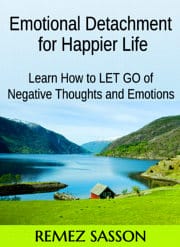
Emotional detachment is an important skill that can help you in many situations.
Let me ask you how you would react in the following situations:
- You are in a hurry and discover that you have a flat tire.
- You make certain plans, but they do not work out as expected.
- Due to various reasons, you miss one of your favorite TV programs.
- You are sure you are going to get a promotion at work, but someone else gets it.
- You are talking with someone, but instead of a two-way conversation, you find yourself listening to his complaints, frustrations, and negative experiences.
Do you become angry and unhappy in these and similar situations? Does your stress level get higher? Do these situations affect your state of mind?
Browse our online courses on meditation, positive thinking, overcoming procrastination, confidence, and freedom from distractions.
Suppose you could remain calm and poised in difficult and uncomfortable situations. Suppose you could keep your state of mind unaffected by them. This might sound strange, but it is possible and within reach.
Every day, we encounter situations that we do not like or hear things that upset us. This creates stress, dissatisfaction, resentment, and unhappiness. Sometimes, we dwell over these matters for hours, days, and even more, wasting precious time and energy.
A little emotional detachment would stop all this.
Emotional Detachment Is an Attitude of Positivity and Calmness
The emotional detachment I am talking about has nothing to do with estrangement, lack of feelings or indifference. You can be loving, friendly, happy, compassionate, and at the same time display detachment when the situation calls for it.
It is an attitude of positivity and calmness that is not disturbed by negative thoughts and emotions, by other people’s stress, and by the environment. With some training, you can develop this attitude.
Emotional detachment can help you remain calm and undisturbed when people criticize you, when plans do not work out as expected, and when encountering upsetting or stressful people.
This is an attitude of LETTING GO. It means letting go of negative thoughts and emotions and of anything that might disturb your mind and emotions.
When you develop this skill, and it is a skill, you will be able to use common sense and reason, and make better judgments and better decisions.
7 Reasons Why You Need Emotional Detachment
Remember, the skill I am talking about here does not denote lack of emotion or being emotionally disconnected. It means possessing calmness, tranquility and common sense.
1. It helps you stop taking things personally.
2. With its help, you stop worrying about what people think and say about you.
3. It does not allow other people’s problems, words and stress to affect your state of mind.
4. It helps you stop dwelling on past negative memories and experiences and enables you to let go of them.
5. When experiencing disturbing emotions, stress, and irritating situations, emotional detachment would help you rise above them, remain calm, and handle any situation wisely and calmly.
6. Emotional detachment allows you to remain unbiased and use your common sense when dealing with difficult or unpleasant people.
7. It helps you protect yourself from being drained out and exhausted when in the company of stressful people.
It is possible to construct a much longer list of the reasons why you need this skill and why it is so useful, but these few are enough to show its importance.
Worries, anger and hurt feelings, create stress and unhappiness, and lead nowhere, except to more pain, suffering and broken relationships. They disturb your mind, disrupt your concentration, and prevent you from focusing on the matters at hand.
A Certain Degree of Detachment Is Important
If you wish to enjoy inner peace, it is imperative that you try to gain at least some degree of detachment.
As you see this skill is important for displaying more common sense, better judgment, better mental focus, and living a happier life.
Learn About Our Online Meditation Course
Various meditation techniques for finding inner peace, expanding consciousness, and awakening.
In this article, I wanted to bring to your attention the importance of emotional detachment and to explain why you need it. To teach all about it, I need more than a short article.
There are various techniques for practicing this skill and learning to let go, which anyone can learn. You can find all about them in the book, Emotional Detachment for a Happier Life, where I explain everything about this skill and provide guidance, instructions and techniques for gaining it.
You can read more about this topic in the following articles:
Emotional Detachment Can Improve Your Life
Do You Know What Emotional Detachment Is?
What is Positive Emotional Detachment – Definition and Meaning
Browse our online courses on meditation, positive thinking, overcoming procrastination, motivation, confidence, and freedom from distractions.



